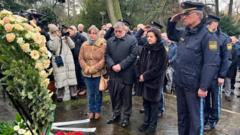The conservative leader of the opposition in Germany, Friedrich Merz, has vowed to enact significant reforms to border and asylum policies following a shocking knife attack in Aschaffenburg, which claimed the lives of a two-year-old boy of Moroccan descent and a 41-year-old man, while injuring several others. The tragic incident, carried out by a 28-year-old Afghan man, has reignited debates surrounding immigration and public safety ahead of the February 23rd federal elections.
Merz, who heads the Christian Democratic Union and currently leads in opinion polls, asserted that he would implement strict controls on Germany's borders on his very first day as Chancellor. He has expressed a commitment to close the borders to all irregular migrants, including those eligible for protection, citing what he describes as the "ruins of 10 years of misguided asylum and immigration policy."
Chancellor Olaf Scholz, who labeled the attack an "act of terror" despite no confirmed terrorist motives, has hinted at a similarly tough response. The Afghan suspect was reportedly linked to prior violent incidents and had been ordered to leave Germany but remained due to ongoing psychiatric treatment. A judge now must decide whether he should be held in custody or sent to a psychiatric facility.
The recent assault in Aschaffenburg follows a series of worrying incidents involving asylum seekers, prompting Merz to argue that assaults should not become the new norm in Germany. He criticized current EU asylum protocols as "dysfunctional," advocating for a return to national laws over EU directives.
As political rhetoric escalates, the far-right Alternative for Germany (AfD) party is gaining traction by making immigration a central theme, with leader Alice Weidel calling for urgent parliamentary action to secure the borders and deport irregular migrants. Critics have suggested that the mainstream parties’ shift towards stricter immigration policies may inadvertently bolster the AfD’s positions.
The liberal Free Democratic Party leader, Christian Lindner, commented that if Merz were to form a government, such drastic measures may be unrealistic due to coalition dynamics with parties like the Social Democrats and Greens. Interior Minister Nancy Faeser cautioned against using the tragic incident for political gain, warning it could benefit right-wing populists.
The attack not only stirred grief but also reverberated through the German political sphere, reflecting deep divides in public opinion on immigration and security as the country prepares for crucial elections.
Merz, who heads the Christian Democratic Union and currently leads in opinion polls, asserted that he would implement strict controls on Germany's borders on his very first day as Chancellor. He has expressed a commitment to close the borders to all irregular migrants, including those eligible for protection, citing what he describes as the "ruins of 10 years of misguided asylum and immigration policy."
Chancellor Olaf Scholz, who labeled the attack an "act of terror" despite no confirmed terrorist motives, has hinted at a similarly tough response. The Afghan suspect was reportedly linked to prior violent incidents and had been ordered to leave Germany but remained due to ongoing psychiatric treatment. A judge now must decide whether he should be held in custody or sent to a psychiatric facility.
The recent assault in Aschaffenburg follows a series of worrying incidents involving asylum seekers, prompting Merz to argue that assaults should not become the new norm in Germany. He criticized current EU asylum protocols as "dysfunctional," advocating for a return to national laws over EU directives.
As political rhetoric escalates, the far-right Alternative for Germany (AfD) party is gaining traction by making immigration a central theme, with leader Alice Weidel calling for urgent parliamentary action to secure the borders and deport irregular migrants. Critics have suggested that the mainstream parties’ shift towards stricter immigration policies may inadvertently bolster the AfD’s positions.
The liberal Free Democratic Party leader, Christian Lindner, commented that if Merz were to form a government, such drastic measures may be unrealistic due to coalition dynamics with parties like the Social Democrats and Greens. Interior Minister Nancy Faeser cautioned against using the tragic incident for political gain, warning it could benefit right-wing populists.
The attack not only stirred grief but also reverberated through the German political sphere, reflecting deep divides in public opinion on immigration and security as the country prepares for crucial elections.





















